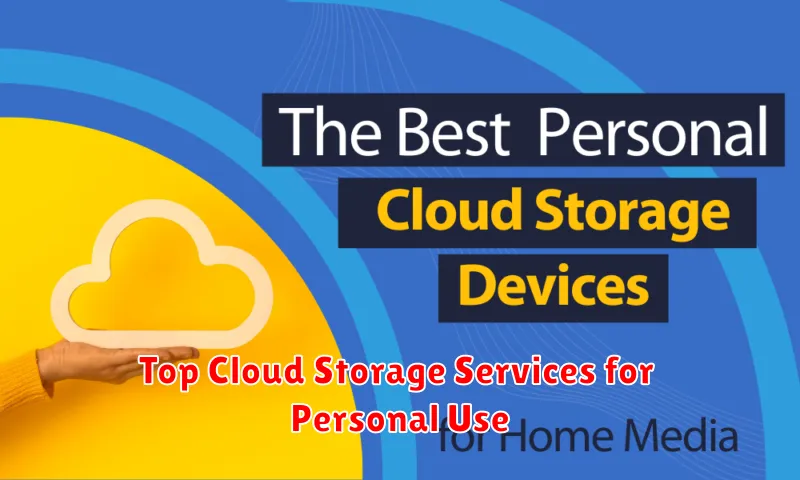In today’s digital age, cloud storage has become an indispensable tool for managing and safeguarding our ever-growing collections of files, photos, videos, and documents. Choosing the right cloud storage service can be a daunting task, given the plethora of options available, each with its own set of features, pricing plans, and security protocols. This article explores the top cloud storage services for personal use, highlighting their key features, advantages, and disadvantages to help you make an informed decision based on your specific needs and budget. Whether you’re looking for free cloud storage, ample online storage space, robust file sharing capabilities, or enhanced data security, this comprehensive guide will equip you with the knowledge to select the ideal cloud storage solution.
Navigating the landscape of personal cloud storage can be challenging, with various providers vying for your attention. From secure file storage and automatic backup to file syncing across multiple devices, understanding the nuances of each service is crucial. We will delve into the best cloud storage services currently available, focusing on their storage capacity, pricing models, security measures, and user-friendliness. By examining these crucial factors, you’ll be empowered to select the perfect cloud storage platform that seamlessly integrates with your digital lifestyle and ensures your valuable data remains safe, accessible, and readily available whenever you need it.
Why Use Cloud Storage for Personal Data?
Cloud storage offers a compelling alternative to traditional local storage methods like hard drives and USB flash drives. It provides a range of benefits that make it an increasingly popular choice for individuals looking to manage and protect their personal data.
Accessibility is a key advantage. Cloud storage allows you to access your files from virtually any device with an internet connection, eliminating the need to physically carry storage devices. This is particularly useful for individuals who frequently switch between devices or travel regularly.
Data security is another important consideration. Reputable cloud storage providers employ robust security measures, including encryption and data redundancy, to protect user data from loss and unauthorized access. This often surpasses the security measures implemented by individual users on their personal devices.
Collaboration is significantly simplified with cloud storage. Sharing files with others is as simple as granting them access permissions. This eliminates the need for emailing large files or using physical storage media for transfer. This feature is particularly beneficial for collaborative projects or sharing memories with family and friends.
Cost-effectiveness is a compelling factor for many users. While some cloud storage services require a subscription fee, many offer free tiers with sufficient storage for basic needs. This can be more economical than purchasing and maintaining physical storage devices, especially for large amounts of data.
Finally, cloud storage offers automatic backup and sync functionalities. This ensures that your data is regularly backed up and synchronized across your devices, minimizing the risk of data loss due to hardware failure or accidental deletion.
Top Features to Look For
When choosing a cloud storage service for personal use, several key features should influence your decision. Security is paramount. Look for services offering two-factor authentication and end-to-end encryption to protect your sensitive data.
Storage capacity is another crucial factor. Consider your current and future storage needs. While some services offer free tiers with limited storage, paid plans offer expanded capacity for larger files and extensive backups.
File syncing capabilities ensure seamless access to your files across multiple devices. Automatic syncing keeps your files updated, regardless of where you made changes. A user-friendly interface is also important. Look for a service with an intuitive design, easy navigation, and convenient file management tools.
File sharing features can simplify collaboration and file distribution. Consider whether the service allows you to share files with specific individuals or create publicly accessible links. Finally, evaluate the cost of the service and ensure it aligns with your budget. Compare pricing plans and features across different providers to find the best value.
Best Cloud Storage Providers Reviewed

Choosing the right cloud storage provider depends on individual needs and priorities. Factors such as storage capacity, security measures, pricing plans, and ease of use should be carefully considered. This review examines several leading cloud storage providers to assist in making an informed decision.
Sync.com prioritizes security with end-to-end encryption. While offering competitive storage plans, Sync.com may have limited third-party app integrations compared to other providers.
pCloud stands out with its lifetime subscription option, a unique offering in the cloud storage market. It also provides robust security features and decent file sharing capabilities. However, some advanced features come at an additional cost.
iDrive is a cost-effective solution for users requiring substantial storage. Its focus is on backup and syncing, with features like physical drive shipping for initial backups. It may not offer the same collaboration features as other platforms.
Google Drive is deeply integrated with Google’s ecosystem, offering seamless access across devices. Its generous free tier and collaborative features are attractive. However, privacy concerns remain for users sensitive to data handling practices.
Dropbox is known for its user-friendly interface and excellent file sharing features. It provides a reliable platform for both personal and professional use, although the free tier is relatively limited.
Free vs Paid Plans Explained
Cloud storage services typically offer both free and paid plans, catering to different needs and storage capacities. Free plans provide a limited amount of storage, often ranging from a few gigabytes to 15 gigabytes. These plans are an excellent starting point for users with basic storage requirements, such as backing up documents or photos. However, they may come with limitations like restricted file sizes or bandwidth caps.
Paid plans, on the other hand, offer significantly larger storage capacities, ranging from hundreds of gigabytes to several terabytes, or even unlimited storage. These plans often include additional features such as enhanced security, file sharing options, collaboration tools, and priority customer support. The cost of paid plans varies depending on the provider and the amount of storage purchased, typically billed monthly or annually.
Choosing between a free or paid plan depends on your individual needs and budget. If you only require a small amount of storage and don’t need advanced features, a free plan might suffice. If you require substantial storage space, advanced features, or enhanced security, a paid plan is likely the better choice. Carefully consider your current and future storage needs, and evaluate the features offered by each plan before making a decision.
Cross-Platform Accessibility
Cross-platform accessibility is a crucial factor when choosing a cloud storage service. It dictates how easily you can access your files from various devices like computers, smartphones, and tablets, regardless of their operating system.
Most leading cloud storage providers offer applications for major operating systems like Windows, macOS, Android, and iOS. This allows for a seamless experience across devices. Look for services that provide web access as well, enabling you to access your files from any device with an internet browser, even if a dedicated app isn’t available.
Synchronization capabilities are also a key component of cross-platform accessibility. Real-time synchronization ensures that any changes made on one device are automatically reflected across all other connected devices. This is essential for maintaining consistency and ensuring you are always working with the most up-to-date versions of your files.
Security and Privacy Concerns

Security and privacy are paramount when choosing a cloud storage service. Data breaches and unauthorized access are significant risks. Providers employ various security measures, including encryption in transit and at rest, two-factor authentication (2FA), and zero-knowledge encryption.
Encryption protects your data by scrambling it, making it unreadable without the decryption key. 2FA adds an extra layer of security, requiring a second form of verification, like a code sent to your phone, in addition to your password. Zero-knowledge encryption ensures that only you have access to the decryption key, meaning even the service provider cannot access your data.
However, no system is entirely impenetrable. It’s crucial to understand the provider’s security practices and their privacy policy. Consider where your data is stored and how it is handled. Some providers comply with specific data privacy regulations, like GDPR, which offer stronger protections for user data.
Be aware of the risks involved and choose a provider that aligns with your security and privacy needs. Strong passwords, enabling 2FA, and understanding the service’s privacy policy are essential steps in protecting your data.
Tips to Optimize Your Cloud Storage Usage
Efficiently managing your cloud storage is crucial for maximizing its value. One of the most effective strategies is to regularly delete unnecessary files. This includes duplicates, outdated documents, and files that are no longer needed.
Leveraging file compression can significantly reduce storage space consumption. Compressing large files, such as videos or high-resolution images, before uploading them to the cloud can free up considerable space.
Syncing only essential folders is another valuable optimization technique. Avoid syncing entire drives to the cloud, as this can quickly consume your allotted storage. Selectively choose which folders are necessary to keep synchronized.
Taking advantage of cloud storage features like file versioning can also contribute to optimization. While versioning provides a valuable backup and recovery mechanism, older versions of files can occupy significant space. Regularly review and delete older file versions that are no longer required.

